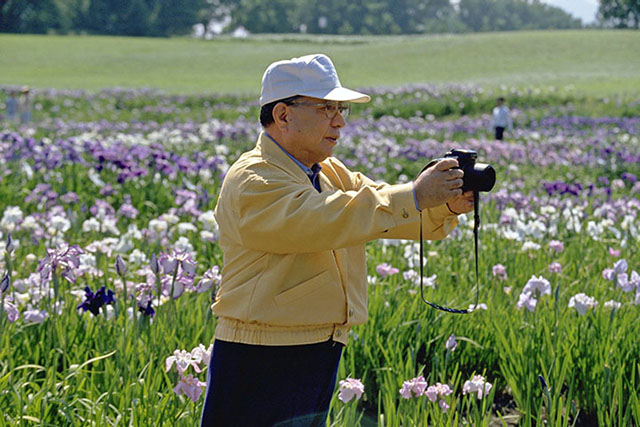Cultivating the Human Spirit: Overview
"Human beings are each a microcosm. Living here on Earth, we breathe the rhythms of a universe that extends infinitely above us. When resonant harmonies arise between this vast outer cosmos and the inner human cosmos, poetry is born."1 [Read full text]--Daisaku Ikeda

Ikeda taking photos in Hokkaido, 1990
Daisaku Ikeda often spoke of the importance of what he called the "poetic spirit." This is not limited to words on a page. What he was describing is an attitude of the heart, an openness to the world, a vital sense of the connection between one's life and the life within all things. The "poetic spirit" is the impulse, the vibrancy, at the core of all artistic expression--music, art, dance and literature.
"The poetic spirit," said Ikeda, himself an acclaimed poet, "has the power to 'retune' and reconnect a discordant, divided world."2 For Ikeda, art and culture are more than forms of entertainment. They are the living expression of the human spirit and the chords that connect not only individuals but cultures, drawing them together in recognition of our common humanity.
As Ikeda wrote, "The life and essence of art--whether it be painting, music, or dance--lies in expressing through a wellspring of emotion the universal realm of the human spirit. It is a melding of the individual and the universal. That is why great art reaches out beyond ethnic and national barriers to move people all over the world."3
And, "To deepen one's understanding of music is to gain a closer insight into the very source of human culture; it is a quest leading to the quintessence of humanity. A love for music unites people and strengthens the pulse of peace and creativity."4
There is a direct link between art and culture and peace. Much of Ikeda's life and energy focused, in various ways, on exploring and revitalizing this connection, at both an individual and institutional level. He founded an international concert association and fine arts museums to promote peace through cultural exchange and he was, as mentioned, a prolific poet and author as well as photographer.
The Buddhist movement that Ikeda headed could itself be described as a movement to encourage the "poetic spirit" within all people. He described it as a movement to nurture and cultivate the potential within human life and bring peace and culture to blossom through the ideals of Buddhism.
Art, he affirmed, is an irrepressible and natural expression of humanity, and it is also inextricably linked to religion, in as much as it functions or seeks to effect the "melding of the individual and the universal."5
One sees in Ikeda's description of the poet the shared spirit of the bodhisattva, a person who relieves the suffering of others: "A poet is one who offers people words of courage and hope, seeking the perspective--one step deeper, one step higher--that makes tangible the enduring spiritual realities of our lives."6 [Read full text]
The arts and culture function to revitalize and restore the human spirit and humanity itself. "Our planet is scarred and damaged, its life systems threatened with collapse . . . Modern civilization will be healthy only when the poetic spirit regains its rightful place."7 [Read full text]












